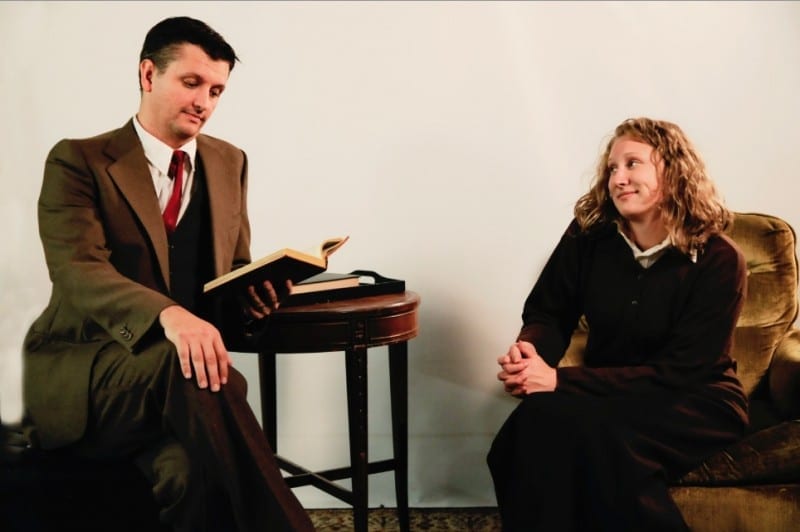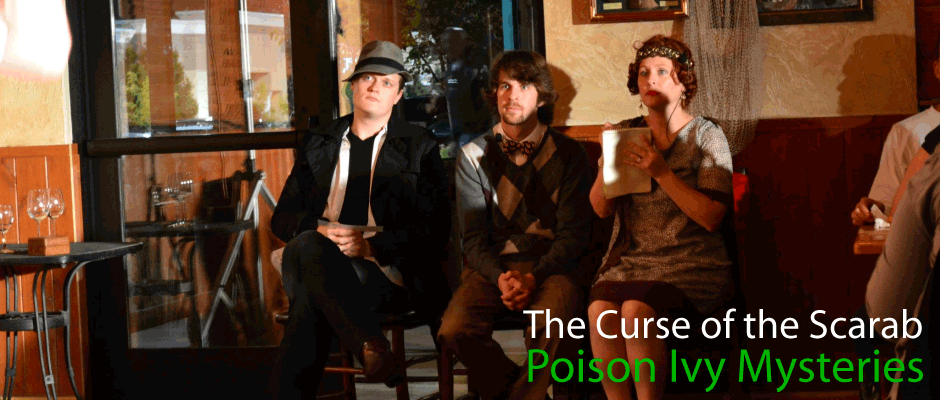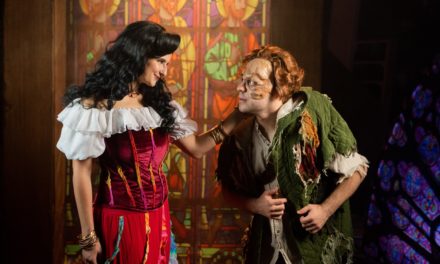PROVO — Swallow the Sun opens with C.S. Lewis and Paddy Moore on army cots discussing their mutual love of literature and Ireland. The audience meets a young C.S. Lewis, an atheist, who has yet to accept Christianity and establish himself as one of its staunchest literary defenders.

Ken Foody and Jana Lee Stubbs. Photo: Naoma Wilkinson. Show closes September 8, 2012.
Ken Foody’s C.S. Lewis is as arrogant and condescending as stereotypical Christians like to imagine stereotypical intellectual atheists. John Schroeppel’s Paddy Moore contrasts with a lovable mix of cheer and apathetic agnosticism. (Schroeppel is unfortunately topped with a misguided toupee whose only excuse for being in front of an audience, ever, is its comic consumption by a dog. I presume it fulfilled said purpose in a previous play, because it sadly didn’t happen in this one.) The two characters promise to care for the other’s family should the one of them die, and thus the scene establishes a relationship on which hinges the rest of the play. The scene also establishes playwright Mahonri Stewart’s preference for lengthy exposition via conversation rather than action. Without straying from this precedent, the play basically consists of almost every conversation atheist C.S. Lewis ever had regarding anything that had any tangential relationship with spirituality. In all but a few text-heavy scenes, Lewis merely sits in one drawing room or another expressing his belligerent atheism and chauvinistic intellectualism to one group of acquaintances or another.

Erika Coleman, Ken Foody, and Susan Phelan. Photo: Naoma Wilkinson.
Along the way, Paddy introduces Lewis to his family and close associates, each of whom has his or her own idea of spirituality and expresses it in detail and repeatedly. Paddy’s mother Mrs. Janie Moore (played convincingly by Susan Phelan) is still beautiful and energetic enough to command a room. Paddy’s sister, Maureen Moore (Erika Coleman) speaks and dresses in a manner that makes her character initially ambiguous and ultimately reminiscent of an idiot child. Maureen’s violin teacher (Jana Lee Stubbs) is added for comedic relief in a few scenes, one of which was actually funny due to G. Randall King‘s fantastic direction, which had the characters hilariously edging each other off a sofa. Lewis also meets Paddy’s uncle, whose dabbling in the occult is played as well as possible by Lawrence McLay and written as excessively as possible by Stewart. Owen Barfield, played by Bryce Bishop, may be the most believable of this group, expressing his spiritual views modestly and his friendship unassumingly.
None of Mahonri Stewarts’ characters is deeply developed, and each serves mainly as a talking point for comparing various aspects of C.S. Lewis’ developing paradigm. Childhood best friend Arthur Greeves (played by Allen Stout) is a concerned Christian, a lovable hypochondriac, a distractingly impolite houseguest. Unfortunately, Greeves is believable with none of the aspects of his character. Older brother Warnie Lewis (Sam Schofield) exists solely to be on roughly the same page as C.S. Lewis about everything. Finally, the audience meets Albert Lewis (Randy King), C. S. Lewis’s cold father whose unemotional parenting after his wife’s death still pains his sons. C.S. Lewis drops in on acquaintances to debate, at length, with each of them. While there are a few breaks in Lewis’ argumentative brooding, such a scene where he play-acts a rowdy Quasimodo, these are so rare as to make them unbelievable and uncomfortable.
C.S. Lewis’ literary friends J.R.R. Tolkien (Chris Bentley) and Hugo Dyson (Mathew Price Davis) are by far my two favorite characters. I don’t know whether Stewart had a lapse of believability as he wrote their characters or these actors just have the Midas touch, but I would have preferred a play that dealt exclusively with C.S. Lewis’ interactions with these men. Their characters had a dynamic realism, and when they were on stage I finally felt like I was watching a play and not a reading of C.S. Lewis’s most boring letters. Phelan’s Janie Moore would have rivaled these characters had Stewart not lingered on the awkwardly age-inappropriate sexual innuendo between she and C.S. Lewis. (In real life, the nature of their relationship was never known, even by their most intimate of friends.).
During the intermission, Davis lay on stage eating candy and reading a book, in character as Hugo Dyson. When the scene commenced, he’d already established Dyson as a whimsical literary. Unfortunately, Davis dropped a piece of candy, and it remained in the well-lighted center stage throughout the rest of the play. Even during C.S. Lewis’ climactic monologue, a red gummy candy rested conspicuously at his feet. That candy was basically representative of the entire play: there were a few moments of brilliance—in which Stewart’s playwriting was highlighted by fantastic acting—but they rarely went off without a glaring hitch left for the rest of the cast to trip over.
The show also felt under rehearsed. Lapels and shirts and wigs were distractingly out of place in ways the actors must have noticed but weren’t comfortable enough in their parts to fix. Actors stumbled over their lines again and again. And the accents . . . oh, the accents. Please, please, the cast of Swallow the Sun, I beg you to drop the accents. Very few of you manage to keep a consistent accent, and the rest of you wander between different combinations and degrees of cowboy, inebriate, and pirate-gruff. And then when the script includes conversations about the characters’ accents it’s impossible for the audience not to be distracted.
Now, to speak of the set. The Castle Amphitheater doesn’t particularly lend itself to drawing room scenes, but the lighting, sound, and set all drew on the imagination wonderfully. Davis worked wonders with lighting to move the audience’s attention about the uncurtained stage (which often represented multiple rooms at once). Stout’s use of sound was impressively flawless (even in an unintentionally eerie voice-of-God scene I would have preferred not to hear). Props, as well, are in order for props master Michael John Larson, whose minimalistic approach suited the subject matter and the set.
Overall, the show was a step down from the source material. I’ve read C.S. Lewis’ account of his conversion, Surprised by Joy, and it is, just like the play, mainly about how C.S. Lewis liked to read Norse mythology and was never really sure how he became Christian except that it happened during a walk to the zoo. The difference is that C.S. Lewis is a great writer, and he managed to make it interesting. Mahonri Stewart uses this play as a story-less excuse to present every slight variation in C.S. Lewis’ thought process as he navigated his pre-Christian existential angst, and it is an excruciating three hours. If I hadn’t committed to review this play, I would have left at intermission. Fortunately, obligation kept me glued to my seat, and I was fortunate enough to see the show stolen, at least for a few minutes, by Davis and Bentley.




